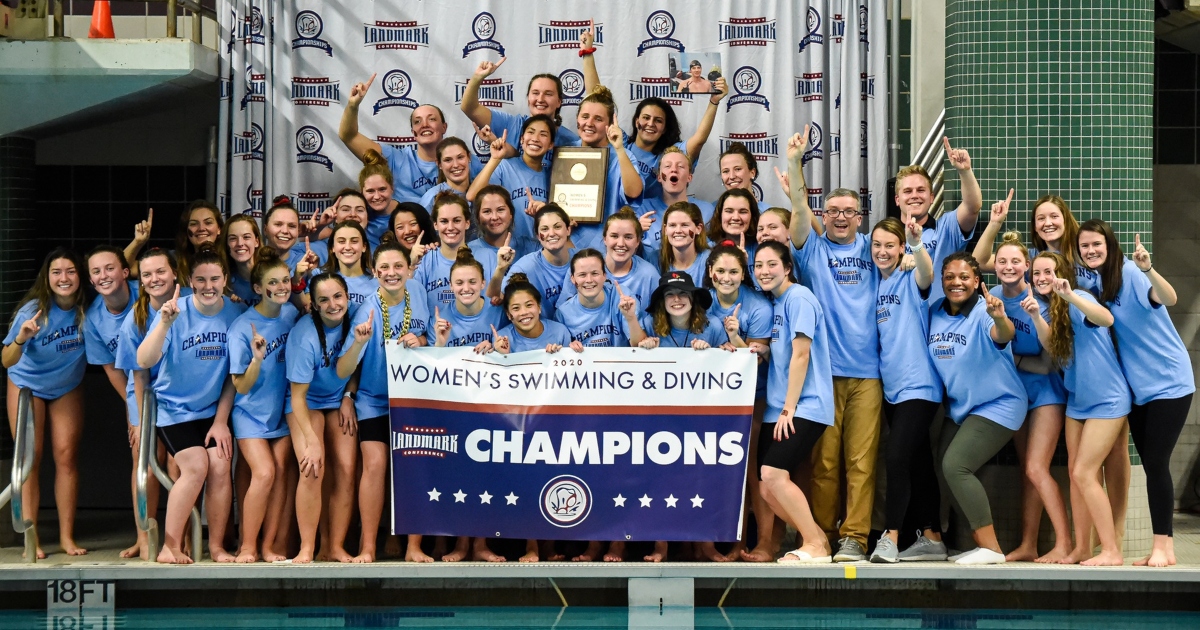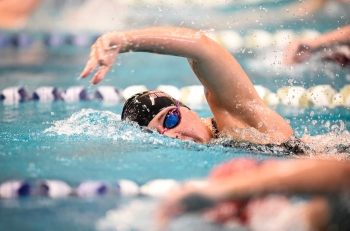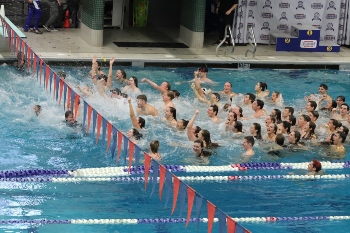
An interview with Elizabeth Spernal (B.A. English '20)
Last month the women's swimming and diving team won their first-ever Landmark Conference title and helping to lead the team to victory was captain and senior English major Elizabeth Spernal, who generously agreed to give us some insight into the hard work and dedication required to swim and study like a champion.
Why did you choose to study English at Catholic U.?
In all honesty, I chose to study at CUA mainly for the location and because I was recruited to swim. I wanted to study English regardless of what college I attended, but the English Department at Catholic University has proven to be an impressive and close knit community that made the decision to attend Catholic all the more worthwhile.
What's it like being a swimmer at Catholic U.?
The culture of a swim team is pretty much the same no matter where you’re from. It’s a community of people who have similar drives and qualities that push us to do our best in all aspects of life. A joke that we bring up often is how sports teams are usually a group of “forced friends” and the Catholic Swimming & Diving team wasn’t really an exception to that joke. The difference is that we all truly became friends. We all spend so much time with each other that it was impossible not to. We practice together, some of us live together, a lot of us are from the same areas, so it’s hard not to connect. We’re also the only sport where the men’s and women’s team practice together, so we consider ourselves one collective team rather than two separate teams. This unity we feel is what makes the team feel more like a family. We hold each other accountable as well as being each other’s support systems. Since we all have a common goal, being a swimmer at Catholic University is being a part of something that is more important than your own personal success.

What has challenged you most as a student athlete? What's been the most rewarding?
I think most student athletes would say that their biggest challenge is time management, but time management is something almost all swimmers learn pretty early in their swimming careers. Especially in high school, where most of us would go to school, go to practice, go home for dinner, do our homework, and go to bed. This would be a daily routine that we would follow without question and it build a foundation that which we become dependent on. When I came to college, I found I had too much free time even with classes and practices, so it was interesting adjusting to life as a collegiate athlete as opposed to that of a high school athlete. Luckily, our coaches offer multiple practice times throughout the day so everyone can make it to the pool no matter what our schedules are. The discipline is still there, it was just adjusted to accommodate the life of a college student.
The Landmark Championship meet, which we refer to as “Conferences,” has always been the most exciting part of every season. We have the longest season out of all the other sports in the NCAA, and everything we do leads to our performance at Conferences. You can feel the amount of energy and excitement from every team on the pool deck to the point where I feel like I’m vibrating. Some of it is nerves and the fear of not performing well personally, but those feelings are grossly overshadowed by your excitement to swim well for the benefit of your team. Even though we consider ourselves one large team, men and women score separately. Our men’s team won Conferences the first three years I have been on the team and the women’s team finished second each year, but the men always shared their victories with the women’s team. In turn, the women’s team was always glad to see the success of our teammates, even if we ourselves did not win the title of “Champions.” However, I was never fully satisfied with second. The women’s team just never had the same opportunity the men did.
This season was different though. Like every year before, the men were confident they would win the championship; but this was the first year that the women’s had a real chance of winning as well. Never in Landmark Conference Swimming and Diving history has there been a school that wins both the men’s and the women’s championship simultaneously. This was the entire team’s goal from the beginning of the season; so we trained harder and smarter than we ever had before, but especially the women’s team. As a captain and as a senior, I wanted to see my team win more than anything. This year’s Conferences was the most exciting because it was the first year that the women were truly equals to the men. Both teams walked in with the confidence of success and each day, the likelihood of the women winning became more and more real over the course of the three days. When we won, of course it was emotional, but more than anything I was satisfied to be able to call myself a Champion.
So, as a senior looking back on four years of collegiate swimming, seeing the women’s team success and growth from what it was my freshman year to what it was this year, was the most rewarding.

Do you have any advice for prospective student athletes? For prospective English majors?
For prospective student athletes, my advice is that even though your team will be some of the first friends you will make in college, don’t limit yourself to other opportunities that the University offers. Befriend people in your major or your classes because even though your team will be like your family, sometimes it’s nice to hang out with people you don’t see every day. It gives you a break that you might not know you need.
My advice for English majors is get to know the community within the English Department! We’re a small department, but we are mighty. The professors are dedicated to the success of their students and are always willing to help. Another useful tool to your success as an English major at CUA is studying and discussing class topics with your fellow English majors. A great way of meeting people within the Department who aren’t in your classes is by getting involved in events and activities that the Department organizes. My schedule never allowed me to get involved as much as I would have liked, but whenever I did have the chance to go to an event, I always left feeling more connected and educated.
Photo credits: Patrick Blaine
